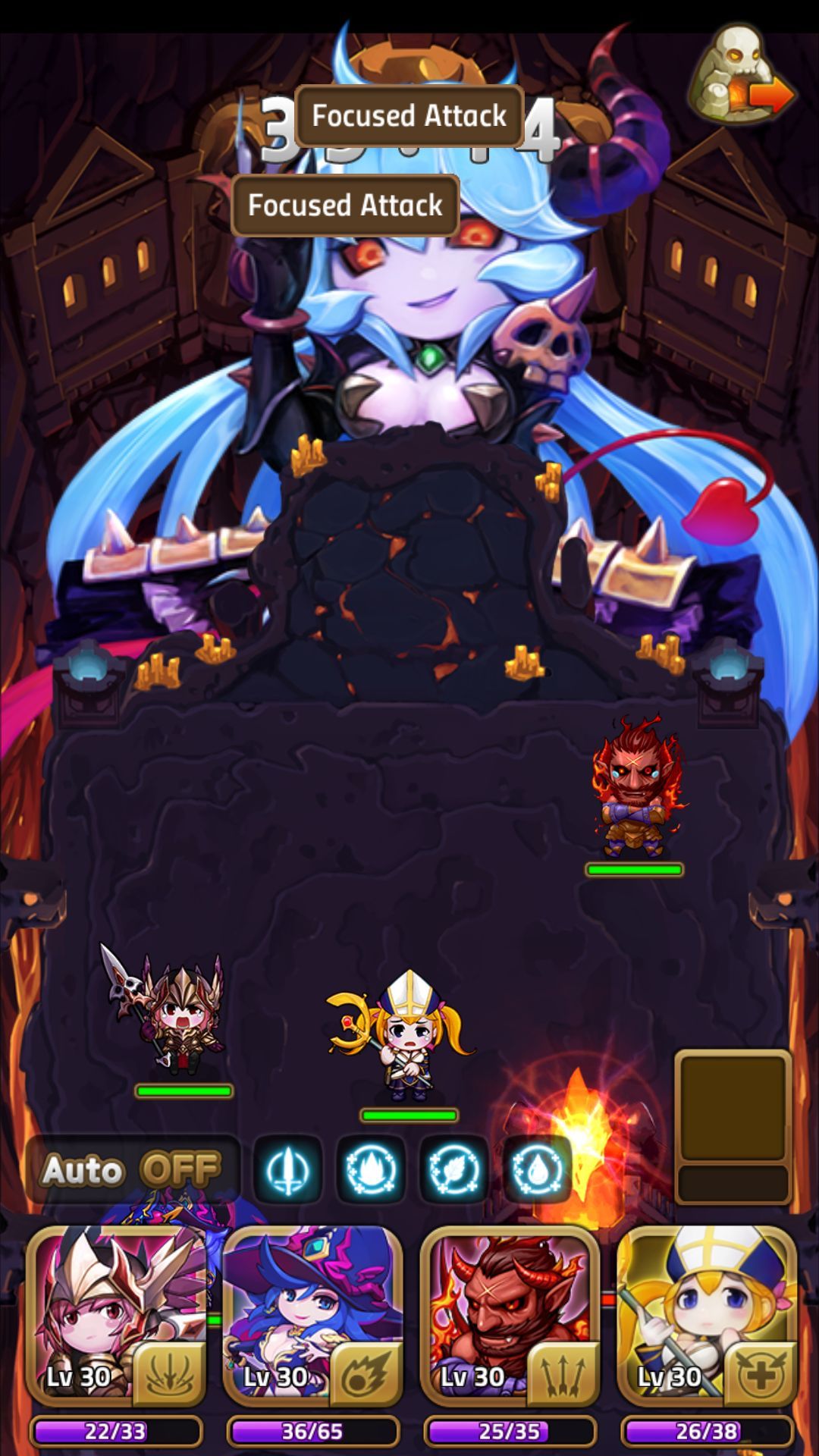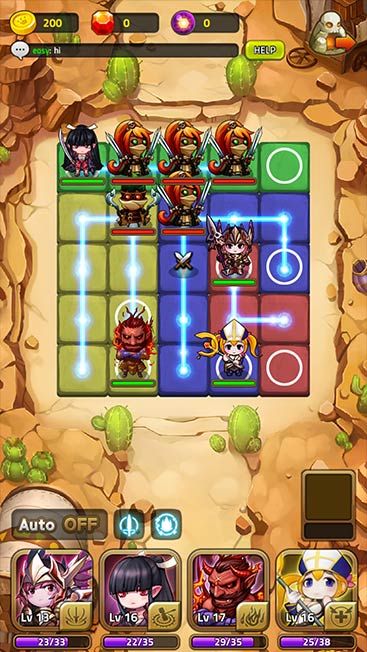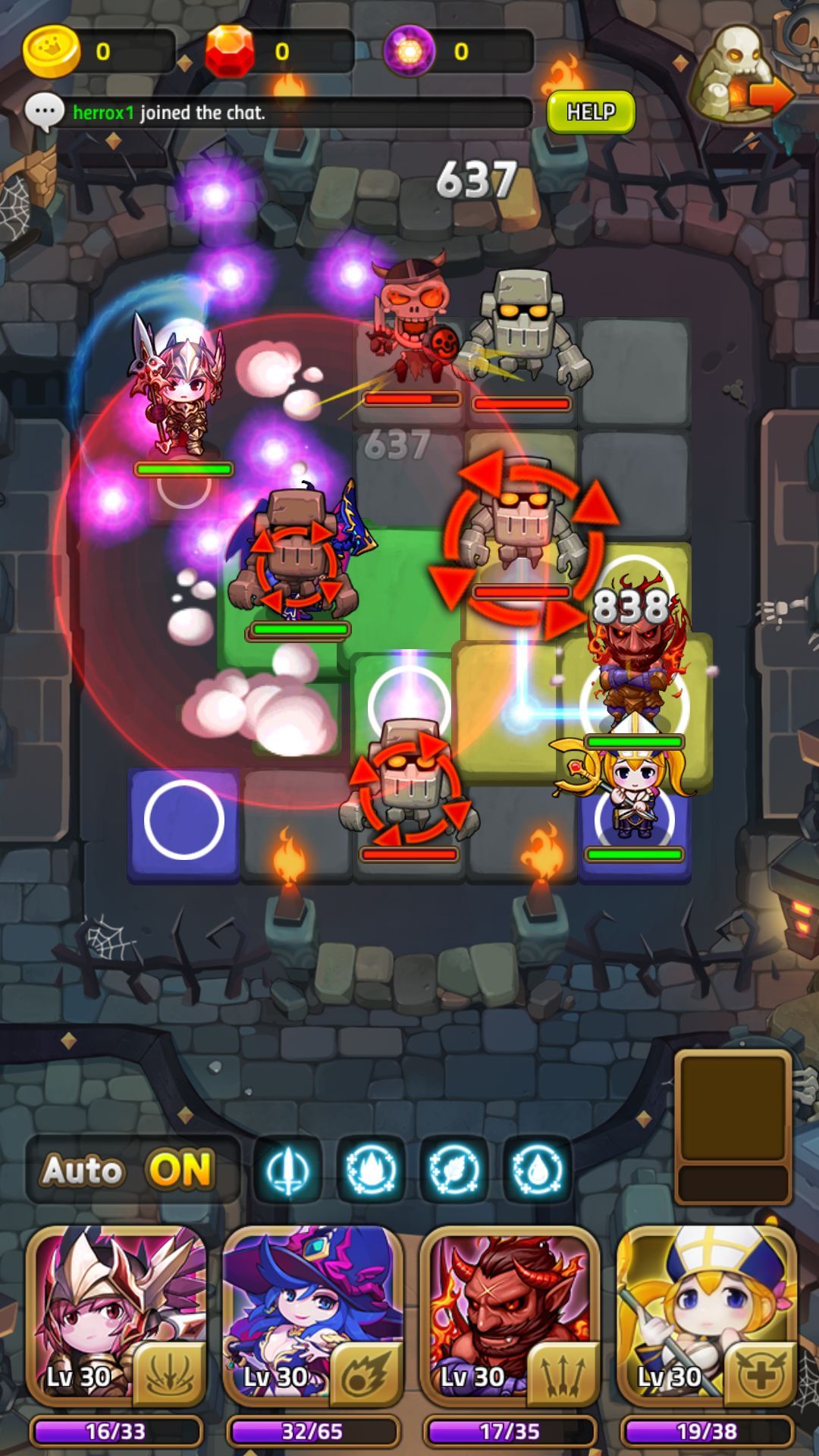 Dungeon Link (Free) is a clever game: it combines line-drawing puzzles, where you have to connect different sets of dots with lines that don’t intersect, and makes it into an RPG battling system. Characters have different attacks and do more damage the longer their lines are, and the more they run over and by enemies. You can level up, combine, and evolve your characters, just like many free-to-play social RPGs, but the puzzle gameplay is the real hook here. Once auto-battling gets involved and the concept of the game just proves to be something you can just ditch entirely, then a lot of the charm that Dungeon Link first has goes away.
Dungeon Link (Free) is a clever game: it combines line-drawing puzzles, where you have to connect different sets of dots with lines that don’t intersect, and makes it into an RPG battling system. Characters have different attacks and do more damage the longer their lines are, and the more they run over and by enemies. You can level up, combine, and evolve your characters, just like many free-to-play social RPGs, but the puzzle gameplay is the real hook here. Once auto-battling gets involved and the concept of the game just proves to be something you can just ditch entirely, then a lot of the charm that Dungeon Link first has goes away.
Each level that you play has a bunch of enemies, and you just draw lines from dot to dot, with those being the starting and ending points for your characters’ paths. There are many considerations to take into mind: if a character has a close-range attack, you may want to run over enemies. If they have a horizontal laser beam attack, then a path that hits multiple enemies is a good plan. Additionally, you can pick up power-ups, and do more damage by doing chains from one color dot to another. Getting a “perfect" attack where all squares are used is a great idea, as it unleashes a powerful attack on all enemies, and it’s more powerful based on the longer chain that you get. Plus, each character has a special attack that can be charged up and deployed. Yet, the battles are simple and you get the gist of them right away. It’s that clever fusion of RPGs and puzzle gameplay that intrigued me, and the game continues to throw new wrinkles into the formula while keeping the core gameplay simple enough.
The meta-game is familiar to those who have played social RPGs. You have characters of different star levels, with the ability to combine and evolve characters. You can get new ones through quests, through lottery systems, and by completing myriad quests. This system is pretty standard for social RPGs, but it forms the bulk of what will keep you hooked long-term. Getting that powerful team full of characters, with different fantasy creatures and plenty of cleavage-bearing women? It’s not reinventing the wheel with Asian social RPGs. The line-drawing stuff is clever, but it’s the fuel to a familiar structure.
Still, there’s nothing bad with familiarity. I like the line-drawing combat, the game has great production values, and there’s loads of stuff to do beyond just the main progression. And hey, the social RPG formula is a case of “if it ain’t broke, don’t fix it." You can make friends, give them swords (the energy to play levels), and get rewards. If you’ve played one, you’ve played them all, but here’s another!
 Dungeon Link has an auto-battling function, and I am kind of not a fan of it. The problem is that it’s the most ideal way to battle, as it always finds the way to make a perfect play where all squares are used. Maybe it’s not the best for using chains, but it’s quite possible that any weaknesses from using auto-battling are made up in the mistakes that you might make while playing and making your own decisions. It’s the driverless car situation: the benefits outweigh the drawbacks.
Dungeon Link has an auto-battling function, and I am kind of not a fan of it. The problem is that it’s the most ideal way to battle, as it always finds the way to make a perfect play where all squares are used. Maybe it’s not the best for using chains, but it’s quite possible that any weaknesses from using auto-battling are made up in the mistakes that you might make while playing and making your own decisions. It’s the driverless car situation: the benefits outweigh the drawbacks.
This is where the game kind of falls apart. The line-drawing is the the thing that makes this stand out from other social RPGs. When you make it so that the unique part of the combat is to your disadvantage to actually play with, then what’s the point? It kind of ruined the game for me. I cared about the character-raising because it was part and parcel with the gameplay system I was enamored by. Take one half of the equation away, and I don’t see myself continuing to play this after this review.
I will say that if you’re a fan more of the social RPG stuff, then you may just still enjoy Dungeon Link. It’s not a bad system. Enhancing characters requires using other characters as materials, and there’s a chance the enhancement might not succeed, but it then increases future chances, which is fair enough to me. This is the kind of game that if you get hooked to, you’ll probably be spending a decent amount of money. But there are frequent deals, including valuable specials for the week you start, with regular offers available too.
The premium currency is handed out with regularity, too: there’s a guy on the screen that hands out 5 gems per hour, and completing objectives will get you gems. I spent $5 early on and got a lot of value out of it. Heck, the swords are difficult to run out of, especially if you make friends who give them to you. There’s so many opportunities to get things that need premium currency that I can’t complain about the monetization one bit. It’s involved, but aimed toward the most dedicated players. You can get plenty of fun for little or no cost.
And there’s a ton of stuff to do. The regular dungeon progression requires that you replay earlier levels, but the randomness in level layouts means that they are usually fresh; the differences in the myriad rewards is why you’ll replay them. Plus, there are later difficulties with better rewards. Then, you have the daily dungeons, which feature special items you need to evolve some characters. There’s a tower with ever-harder monsters and ever-greater rewards. There are raid bosses where you can fight them multiple times to do more damage and to get better rewards. With daily quests, timed rewards, and even PVP battles that unlock, there’s always something to do.
So, it just depends on how much the auto-battling option would bother you or not. Do you like having the option to not play the game, perhaps to your benefit? Do you prefer having a social RPG, and the method for doing so is secondary to you? Then Dungeon Link is for you, and it will give you plenty of ways to build up an army of powerful characters that you can say you have. The game marginalizes its one clever hook, but it’s still clever! And I think that long-term, I can see auto-battling being useful for most people. I just can’t get around that it exists and sinks a game I otherwise really enjoyed.

